DAVE'S DIARY - 4/11/12 - JAMEY JOHNSON/HANK COCHRANE
LIVING
FOR A SONG
JAMEY AND SIDEKICKS DO IT HANK'S WAY
"I came to town a long time ago/ and it's been really good to me as you all know/ but all of us rhyme runners and word hunters/ have some things that we've been through/ so I wrote this song/ hoping I could tell some of it to you." - Living For A Song - Hank Cochran-David James Holster-Bo Roberts.
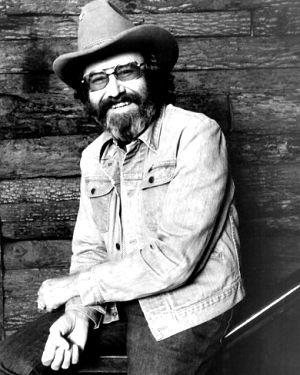 |
Legendary
singer-songwriter Hank Cochran was well prepared for the after life
- he released his autobiography Living For A Song eight years
before he died. It was a smart branding to have all three projects share same title - Living For A Song. |
There was
no shortage of iconic artists donating their talents to the 16-song Mercury
Records album, released in October.
Johnson duets with Willie Nelson, Alison Krauss, Merle Haggard, Leon Russell
and Vince Gill, Emmylou Harris, Asleep At The Wheel, George Strait, Ray
Price, Elvis Costello, Ronnie Dunn, Bobby Bare, Lee Ann Womack, Kris Kristofferson,
Willie and Vince Gill and the Kristofferson, Nelson and Haggard trio.
Hank was born Garland Perry Cochran in the Great Depression in Isola,
Mississippi, on August 2, 1935.
He died at 74 on July 15, 2010, at his Hendersonville home after fighting
spirited health battles.
Cochran had triple bypass heart surgery in 2005 before pancreatic cancer
treatment in 2008.
Then in March, 2010, he had an emergency operation to repair an aortic
aneurysm the size of a grapefruit.
THE EAGLE FLIES AGAIN
"Lately I've heard rumours the eagle may be lame/ just because I've been idle don't mean that I'm tame/ you've jeopardised my freedom, my natural place to roost/ I can fly when I have to, they've turned the eagle loose." - The Eagle - Hank Cochran-Red Lane-Mack Vickery.
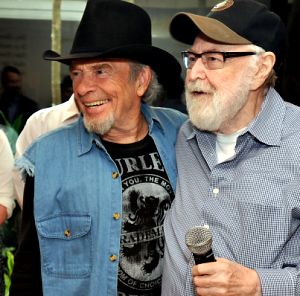 |
Hank's
legacy includes a vast catalogue of songs and, like peers Merle and
Shotgun Willie, a raft of ex-wives who helped fuel song royalties. "I don't write songs," Cochran said of his lucrative legacy. "God writes 'em. I just hold the pen." The longevity of country singer-songwriters is a bonus for peers wishing to honour them in tribute discs, movies or documentaries. Nelson's prowess as an actor means there are plenty of visual memories to compliment his deep body of work. |
At 79 he
has the chance, if not the time, to critique the brace of tribute discs
and songs he has already earned.
Fellow Highwaymen Johnny Cash and Waylon Jennings also dabbled in movies
before prematurely going to God as their careers enjoyed diverse degrees
of rebirth.
Their families have been able to exert quality control over the plethora
of tribute discs and, to a lesser extent, the Cash biopic Walk The
Line.
Hank Williams and Jimmie Rodgers, who died 26 years apart at 29 and 36,
did not live long enough to reap the rewards of their creativity.
But Williams's son Hank Jr, daughter Jett and grandson Hank 111 have kept
the family flame burning with their own careers while others made tribute
discs.
Californian Haggard, also recipient of tribute discs, released his Rodgers
vinyl tribute disc Same Train A Different Song in 1969 - a CD version
with bonus tracks emerged in 1999.
Bob Dylan, Shotgun Willie, Allison Krauss, Steve Earle, Jerry Garcia and
peers appeared on The Songs Of Jimmie Rodgers - the 1997 debut
disc on Dylan's Egyptian label.
COCHRAN - THE DOCUMENTARY
"Do you remember when you loved me/ before the world took me astray/ if you do, then forgive me/ and make the world go away." - Make The World Go Away - Hank Cochran.
But the other
Hank - Cochran - who shares home state Mississippi with Rodgers earned
a double honour, the tribute CD and documentary.
That was just a decade after he published his famed Living For A Song
- a Songwriter's Autobiography.
The Hank Cochran: Livin' For a Song documentary premiered April
25 at Nashville Film Festival.
It includes the last interviews with the Songwriters Hall of Fame legend.
The two-hour film, directed by Wes Pryor and written by Greg Welsch, also
features stories about the many parties Hank hosted aboard his boat, The
Legend.
Singer Jeff Bates, also born in Mississippi, narrates the film.
Others interviewed include Jamey, Haggard, Brad Paisley, Elvis Costello,
one of Hank's five wives - Grand Ole Opry star Jeannie Seely - and his
three sons and stepdaughter.
Several Hank songs are performed in their entirety.
Texan Lee Ann Womack - who appears on the tribute disc - was one of many
Cochran peers who attended the premiere with Hank's widow Suzi.
"All I did was collect letters and papers and pictures to help them
put things together for the film," said Suzi who was wed to Hank
for his final 28 years.
"His first wife, who he was married to twice, gave me some of his
old letters. One was talking about being somewhere with early rock 'n'
roll legend Eddie Cochran when they were together as the Cochran Brothers."
I couldn't watch for a long time," confessed Suzi who says her favourite
Hank song is Don't You Ever Get Tired of Hurting Me.
"Then I finally got to where I could, but the first two times it
was hard for me. Then I realised what a gift of life it was for Hank."
GUITARS AND TEARS
"I just
came in here from force of habit/ I don't intend to spend too much time
in here/ but I saw you heading for the jukebox/ and if you play A-11 there'll
be tears." - A-11 - Hank Cochran.
Hank's gift was a bonus - he suffered pneumonia, measles, mumps and whooping
cough at the age of two.
At the age of nine his parents split and he lived with his father before
he was put in a Memphis orphanage.
He later worked in New Mexico oil fields, aged 12, with uncle Otis who
taught him to play guitar in a two-year tutelage.
In 1954, just 18, he and late rockabilly singer Eddie Cochran (no relation)
toured as the Cochran Brothers before he moved to Nashville.
Hank, once wed to Grand Ole Opry star Jeannie Seely, also recorded five
albums and had a Top 20 hit in 1962 with Sally Was A Good Old Girl.
But it was as a songwriter, mentor and publisher that Cochran excelled.
He gave Willie his first break when he persuaded fellow Texan Ray Price
to sign him to his publishing company Pamper Music.
Hank and Willie recorded duets and Cochran appeared on the soundtrack
of the 1980 Nelson movie Honeysuckle Rose.
But it was a trip to the Bahamas that Cochran recalled in one of his final
interviews.
BAHAMAS BUST
"This ain't my first rodeo/ this ain't the first time this ol cowboy's been throwed/ this ain't the first I've seen this dog and pony show/ honey, this ain't my first rodeo." - This Ain't My First Rodeo - Hank Cochran-Max D Barnes-Vern Gosdin.
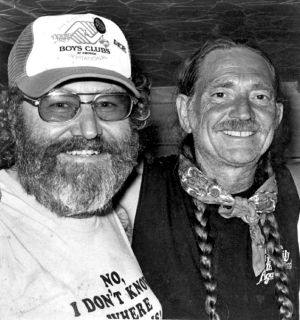 |
It
preceded one of many encounters with the law over Willie's favourite
vegetarian appetiser and a trip to the White House as guest of President
Jimmy Carter. "I was on the road with Willie and my boat was in the Bahamas," Hank revealed. "We had a couple days off and suggested we go to the boat. He called his wife and I made the reservations. We had to fly to Treasure Key and take a water taxi to the boat at Green Turtle. I told him "Don't take any smoke or anything 'cause there is a lot over there anyway. He put on a clean pair of jeans and put his dirty jeans in his duffle bag. I just packed three pair of jeans and bought T shirts on the island when I visited my boat. |
I told Willie
not to check our luggage as I went to change my clothes. I came back and
our luggage was checked with the airline. My briefcase was part of my
luggage with my passport in it. I told him they will lose it for sure.
Yeah-it got lost. They all knew me and Willie at customs, stamped some
papers and let us go to my boat. After two days, Willie thought we should
go get out luggage at the airport. I told the captain of the boat to take
us to Treasure Key and wait for us to return. If anything happens send
someone for us.
The luggage had come in and the guy sat Willies' bag up on the counter.
He asked Willie if that particular bag was his. He asked when pulling
a bag out of Willie's jeans that were in the bag, "Mr. Nelson, what
does this look like to you?" Willie said,
"Kinda looks like marijuana to me."
The gentleman then said, "Mr. Cochran, what does this look like to
you" and I said, "Looks like I need a drink". They had
to call the police from Cooperstown-only ten miles away.
The customs officer said, "I didn't know this was Willie's bag and
I have already called police in Cooperstown. Well, they took us to Cooperstown.
I asked if they were going to put us in jail. The policeman replied, "No,
but you will have to make bail." Neither Willie nor I had any money
on us. We stood around outside and a friend of mine, Donny, went to the
boat for me and got the $800.00. While we were waiting on Donny with the
money we stood around and had a beer. Finally, Donny came back with the
money. One of us made a mistake after they released us and asked if they
would give us the marijuana back! Willie jumped over a rail as we were
going down the street back to the boat and sprained his ankle! The next
day he was flying to the White House. He did a network TV show with Barbara
Walters soon after the trip. One of the questions she asked if he had
ever had a problem with smoking, Willie looked right in the camera and
said, "No."
BEDSIDE SINGING SESSIONS
"I've got a new car and it drives just like a dream/ I've got money and I can buy most anything/ I've got places to go and things to do/ I've got everything, everything but you." - Everything But You - Hank Cochran-Willie Nelson.
Willie uplifts
the Buddy Cannon-Dale Dodson produced CD Living For A Song, released
October 16, and sequel to Johnson double disc The Guitar Song in
2010.
Johnson duetted with Billy Joe Shaver on Hero on Willie album Heroes released
on May 15.
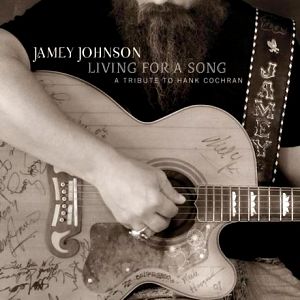 |
He also
joined Kristofferson and Snoop Dogg on the satiric Roll Me And
Smoke Me When I Die. "Shortly after he first met Jamey, Hank was diagnosed with pancreatic cancer," said his widow, Suzi Cochran. "So for the two years he lived after that, Jamey would get off the road and pull his bus right up to the hospital, run up and see Hank and raise Hank's spirits. The last time Jamey saw Hank was the night before Hank died." Johnson, born in Enterprise, Alabama, joined producer Cannon and Billy Ray Cyrus at Cochran's bedside as they handed the guitar back and forth while singing Cochran's songs. |
Cochran died
about six hours later and inspired the tribute album.
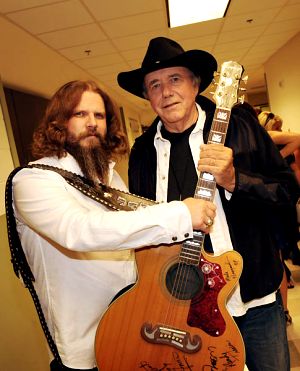 |
"We all met at the house one day and sang some songs," Johnson said. "Bobby Bare was introducing me to a bunch of songs that when I thought I heard it all, I hadn't heard anything yet. All the best stuff was the stuff I didn't know about yet. An entire list of songs was created, not because I knew these songs existed and wanted to cut them, but because the other person did. Everybody got to pick their own, and so for me, it was just as much of a journey as it was for the band or anybody else involved." "Hank
adored Jamey," Suzi Cochran said. |
Cochran has
joined the equally prolific writing partners Harlan Howard, Vern Gosdin,
Mack Vickery and Dave Kirby in that posthumous palace for iconic writers.
Surviving peers including Johnson explain the impact of those songs -
we have the unedited dialogue below.
Livin'
For a Song: A Tribute to Hank Cochran
The Songs and Their Stories
1. MAKE
THE WORLD GO AWAY (Hank Cochran)
Jamey Johnson & Alison Krauss
Hank Cochran
was inspired to write this because of a line he heard an actor say in
a movie.
Song publisher Hal Smith told Cochran that it was the worst song he'd
ever written, because he didn't believe that anyone really wanted to make
the world go away. Cochran was determined to prove Smith wrong. Although
it is now considered to be a country classic, the song was first introduced
by pop torch singer Timi Yuro in the summer of 1963.
That same year, Ray Price made the song a country hit. Just two years
later, Eddy Arnold sang it on a thematic album of "world" songs.
This 1965 version became both a country and a pop smash. Dean Martin,
Elvis Presley, Tom Jones and Martina McBride are among many who have subsequently
recorded Make the World Go Away. It is Hank Cochran's most-recorded song.
"Hank's
favourite singer was Alison Krauss," says his widow, Suzi Cochran.
"He always used to listen to Alison Krauss and every new CD that
came out, Hank had, but he never met her. When I heard she was doing Make
the World Go Away. I was thrilled to death. Hank would have been thrilled.
It turned out wonderfully, just the way it would have been if Hank would
have produced it. Perfect."
2. I FALL TO PIECES (Hank Cochran/Harlan Howard)
Merle Haggard & Jamey Johnson.
"Grand Ole Opry star Jan Howard, co-writer Harlan Howard's then-wife, sang the first demo of this song. Producer Owen Bradley brought it to Patsy Cline, who initially hated it, because she thought it was too pop sounding. Cochran gleefully reported that Cline liked it just fine when it became her first No. 1 record. It was also Cochran's first big hit as a songwriter. Since that 1961 version I Fall to Pieces has been recorded by Linda Ronstadt, Conway Twitty, Crystal Gayle and many more. A duet version of the song by Trisha Yearwood and Aaron Neville earned them a Grammy Award in 1994.
"I always
loved Patsy's recording of it," Haggard says. "I was just hoping
I could do that.
"Hank was unique," Haggard says. "He wrote the kind of
music that we needed. He understood what each artist was and he was able
to tailor a song for you and usually brought it to you in person.
"Hank was a lot of fun to be around. Usually when you were around
Hank, you wound up writing a song. He was always writing, always writing.
That's really who he was: he was the songwriter.
"He was really an artist who chose not to be an artist. All the artists
respected his ability to perform a song. One of the things that was a
secret about him getting so many good cuts was that the singers wanted
to see if they could just sing that good. He had a real light, timid voice,
but if you got down close to it, it was really good. Singers that understood
wanted to sing his songs right. I know I did."
Adds Suzi Cochran, "It's great that Merle sings I Fall to Pieces. To hear Merle sing it is wonderful. That was a special song to Hank because of Patsy. He and Patsy were really close. They were really good friends."
3. A WAY
TO SURVIVE (Moneen Carpenter/Hank Cochran)
Jamey Johnson, Leon Russell & Vince Gill
During his
early Nashville years, Hank Cochran wrote for Pamper Music. The company
was co-owned by Ray Price so he often got the first crack at new Cochran
tunes. Price introduced A Way to Survive in 1966, and it has proved
to be an evergreen song. In 1997 Gene Watson made it the title tune of
an album.
"I told Buddy that Leon would be a good one to do one of these Hank
songs with because of the obvious connection," Johnson says. "Leon
and I met at a studio in Nashville that's meant a lot to me over the years.
It's where I recorded Lonesome Song and a lot of The Guitar Song. He came
by that studio right there to do that part."
4. DON'T
TOUCH ME (Hank Cochran)
Emmylou Harris & Jamey Johnson
Future Grand
Ole Opry star Jeannie Seely was working as a secretary at Liberty Records
on the West Coast when Hank Cochran was recording for the label.
After hearing her music, he suggested she move to Nashville. He wrote
the torchy Don't Touch Me for her, and it earned Seely a 1966 Grammy
Award. They were married to one another between 1969 and 1979. Seely's
emotional singing led to her billing as Miss Country Soul and Don't
Touch Me subsequently became a 1969 R&B hit for Bettye Swann and
was also notably recorded by soul singer Etta James in 1997.
5. YOU
WOULDN'T KNOW LOVE (Hank Cochran/Dave Kirby)
Ray Price & Jamey Johnson
By the time Ray Price introduced You Wouldn't Know Love in 1970, his Pamper Music had been sold to Tree International Publishing. Cochran went to Tree with the company. By that time, Price had scored on the popularity charts with five previous Cochran songs, so he was still eager to find a sixth, wherever it was published.
"Ray is a good definition of an old Marine, a rock-solid spirit," Johnson says. "A guy whose direction is so strong and whose will can't be bent. I hear that his dogs don't even come when he calls!"
6. I DON'T
DO WINDOWS (Hank Cochran)
Jamey Johnson & Asleep at the Wheel
This is one of Jamey Johnson's favourite Cochran songs. Cochran introduced it, himself, on a 1980 solo album titled Make the World Go Away. When Willie Nelson cast him for a part in country-music movie Honeysuckle Rose, Cochran reprised the song on the film's soundtrack that same year. The Honeysuckle Rose soundtrack album has sold more than two million copies.
"I like
the song because it's so irreverent, which is certainly one of Hank's
qualities," says Ray Benson of Asleep at the Wheel. "Recording
the song was so simple because Buddy Cannon and Jamey just said they cut
a demo of it in Nashville. Asleep at the Wheel has a very distinctive
style. I said to Buddy and Jamey, 'You know, the cut you did in Nashville
of the demo is fantastic. Nashville has the best players in the world.
We don't really want to just copy that because you've always done it as
good as it could be done.'
"Buddy said, 'No, I just want you to do what y'all do.' So it was
like falling off a log. We went in and did it in two or three takes maybe.
First of all, it's live. We all sit there and we play it. It's got a good
little slide kind of feel."
7. SHE'LL
BE BACK (Hank Cochran/Dale Dodson/Red Lane)
Elvis Costello & Jamey Johnson
She'll
Be Back was originally recorded as He'll Be Back by Lee Ann
Womack on her 2002 album Something Worth Leaving Behind. She also
re-recorded it on film for the 2012 Cochran bio-documentary Livin'
For a Song. When Elvis Costello recorded his Almost Blue LP
in Nashville in 1981, he included a version of Cochran's He's Got You
on the collection.
So the British pop star has long been a fan of traditional country music
and is thus a longtime fan of Hank Cochran.
8. WOULD
THESE ARMS BE IN YOUR WAY (Hank Cochran/Vern Gosdin/Red Lane)
Jamey Johnson
During his
brief life as a recording artist, Keith Whitley performed several Hank
Cochran songs. Would These Arms Be in Your Way became a Top-40
hit for the singer in 1987. A decade later, co-writer Vern Gosdin released
his version of the song. It has also been recorded by Mark Chesnutt.
"That's a fantastic song," says Willie Nelson. "It's great,
just the title of it. He could have just sold titles."
9. THE
EAGLE (Hank Cochran/Red Lane/Mack Vickery)
George Strait & Jamey Johnson
Waylon Jennings' 1991 recording of The Eagle became Hank Cochran's last Top-40 hit as a tunesmith, to date.
"I was
introduced to Hank by my friend Dean Dillon," says George Strait.
"They wrote one of the most clever songs which I was lucky enough
to get to record called The Chair. I wish I had known Hank better,
but unfortunately our paths only crossed a few times. Those times, however,
were very special.
"I remember him coming to my office in Nashville one time with Dean.
I was in the process of recording a Christmas album and they had just
written For Christ's Sake, It's Christmas. They played it live
for me there and it just blew me away. I recorded it that day. The
Eagle was a song I wasn't that familiar with, but what a message it
sends, especially in this day and time. I had thought about Jamey and
me doing The Chair together, but after he played me The Eagle
it was so obvious. I'm very proud of Jamey for doing this and am so glad
I was able to be included."
Suzi Cochran says, The Eagle was written about the Gulf War. It's
a war cry, the eagle representing the U.S."
10. A-11
(Hank Cochran)
Ronnie Dunn & Jamey Johnson
Although
never a giant hit, this Cochran song is something of a honky-tonk standard
and is performed by many. Johnny Paycheck did the original version in
1965, and it has also been recorded by Buck Owens, Clinton Gregory, Norma
Jean and Darryle Singletary among others.
"Buddy Cannon sent the song to me," Ronnie Dunn says. "I
think Buddy was probably doing the casting there and did it because it's
just hard-core honky-tonk. It's from an era when country music was pretty
much confined to beer joints and clubs. It refers to a jukebox. I mean,
for him to be able to write stuff that goes from the gamut of I Fall
to Pieces and Make the World Go Away to a song like A-11,
which is pretty primal straight forward - I call it beer-joint music -
is pretty cool."
Haggard says, "'A-11 is a wonderful song, one of the all-time
greats. I guess you can call it a standard."
11. I'D
FIGHT THE WORLD (Joe Allison / Hank Cochran)
Bobby Bare & Jamey Johnson
After Hank married Suzi Cochran in 1982, she took him home to meet her folks in Pittsburgh. He told them he'd written this song just for her, and everyone cried when he sang it. She found out a decade later that the song was, in fact, more than 20 years old. Among its many recordings, the one by Jim Reeves is probably the best known. Although Bobby Bare never had a major hit with a Hank Cochran song, the two were lifelong friends. In fact, Cochran was the best man at the wedding of Bobby and Jeannie Bare in 1964. Bare previously recorded I'd Fight the World on his hit Detroit City album of 1963.
"The
song I did was a song that I had recorded back in the early sixties,"
Bare says. "I chose that song because, number one, I wouldn't have
to learn a new song. Number two, I've always loved that song. I was living
in L.A. in the sixties and Hank would come to L.A. and he'd be out at
my house and we would go over songs and that was one of them.
"Actually, Hank didn't play this song for me. Eddy Arnold recorded
it. I learned it on one of his albums and I just loved it. Hank didn't
play it for me, but Hank taught it to me. His phrasing, of course, is
always impeccable.
"This current cut compared to the one that I did back in the sixties
is better really, in my opinion, because it's simpler, not as tricky.
It's straight-ahead. The one I did, of course, I was selling millions
of records to kids, so they had to sweeten it up with strings and stuff
like that. This one is just straight-ahead good. Good feeling. I think
we did Hank justice on this one."
12. DON'T
YOU EVER GET TIRED OF HURTING ME (Hank Cochran)
Willie Nelson & Jamey Johnson
This song was Cochran's favourite of his many compositions. It has been a big hit three times, most recently in 1989 for Ronnie Milsap. Willie Nelson has previously recorded it as a duet with Ray Price, who sang the original version of the song in 1966.
"I learned some new things," Nelson says. "I learned Hank wrote some songs that I hadn't heard before. I thought I knew all of Hank's songs. But I chose the one that I really liked Don't You Ever Get Tired of Hurting Me. Ray Price had such a fantastic record of that and so that was the one that I thought I would want to do. There's a lot of great songs on there."
Adds Haggard, "I recorded that, but Ray Price, I think, had the best well-known record on that. I even wrote a line on that song, so I know Hank didn't write that line. When I said it, I did it at the session. When the take was over, Hank hit the button and he said, 'I'd a thought of it eventually.'"
Says Bobby
Bare, "My favourite Hank song is Don't You Ever Get Tired of Hurting
Me. I love that song. Who besides Hank could come up with a line like,
'You make my eyes run over all the time?" That's classic.
"The reason Hank wrote so simple was because he didn't know any big
words," Bare says.
"Hank was not an educated person; he wrote strictly from emotion,
and that's what I love.
The people who use big words are just trying to cover the fact that they're
afraid to put their emotions on the line. Hank was the most fearless person
I ever met when it came to writing a song. He would lay it out and say,
'Here it is.' Unbelievable. That nerve doesn't exist anymore."
13. THIS
AIN'T MY FIRST RODEO (Max D. Barnes/Hank Cochran /Vern Gosdin)
Jamey Johnson & Lee Ann Womack
The song was born when Cochran was having a recording studio built in his garage. Co-writers Vern Gosdin and Max D. Barnes were at the house when Cochran overheard one contractor say to another, "This ain't my first rodeo." The three began working on the song instantly.
"Man, I'm not going to do a duets record and not call Lee Ann," Johnson says. "To me, she's one of the finest singers out there. If it's country music, it's a good fit for her. That was just a given. I know she's a fan of all kinds of Hank songs over the years because it's the same stuff I listen to. Ain't nobody better, and I can say that for everybody on this record too."
14. LOVE
MAKES A FOOL OF US ALL (Hank Cochran/Glenn Martin)
Kris Kristofferson & Jamey Johnson
Hank Cochran
introduced this poignant song on his 1980 LP Make the World Go Away.
The song gained further prominence when Willie Nelson and Merle Haggard
recorded it on their 1987 duet album Seashores of Old Mexico.
"It's probably one of his least-known songs," Nelson says. "It's
a really great song."
"Kris Kristofferson picked that one out," Johnson says. "It's
one of my favourites."
15. EVERYTHING
BUT YOU (Hank Cochran / Willie Nelson)
Willie Nelson, Jamey Johnson, Leon Russell & Vince Gill
This song
dates back to Hank Cochran and Willie Nelson's earliest days together
in Nashville.
Nelson recorded a demo tape of it and six other tunes in 1961. They were
stored in a suitcase and forgotten until Nelson's parents re-discovered
them nearly 15 years later. After that Everything But You and its
song-demo companions were released on an obscure triple LP called Willie
Treasures. When Nelson activated his own Lone Star Records label,
he re-issued these same demos on his 1978 LP Face of a Fighter.
16. LIVIN'
FOR A SONG (Hank Cochran/David Holster/Bo Roberts)
Jamey Johnson, Merle Haggard, Willie Nelson, Kris Kristofferson &
Hank Cochran
Suzi Cochran
says, "This is my version of how this song got on the album and why
it's so wonderful. Hank and two friends wrote that song. Somebody brought
it to Hank and Hank wrote the second half of the song, then he gave it
back to them. But Hank always considered that his biography.
"They were in the studio and I kept saying, 'You have to listen to
'Livin' For a Song.' Well, I knew every time I was handing it to
them, they weren't listening to it. So there was one thing they needed
and I sent down the master of Livin' For a Song. About 20 minutes
later, Buddy called me up and said, 'Who owns that?' 'I do.' He said,
'We're going to use it.' Then it came back just how I saw it in my head
because of all of his dear friends on that. It's unbelievable how it came
out."
Haggard says, "Hank's ability to perform comes across right there.
I mean, he's in there with some of the best singers in the world and he
gets it across better. That's just the way he was: he was a great entertainer.
He entertained the entertainers."